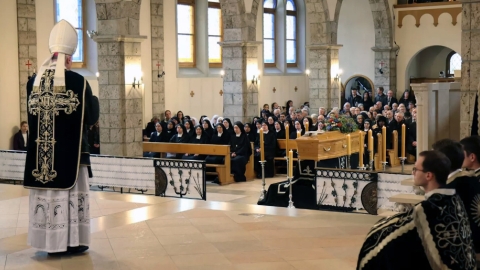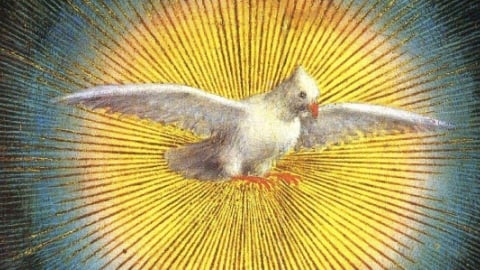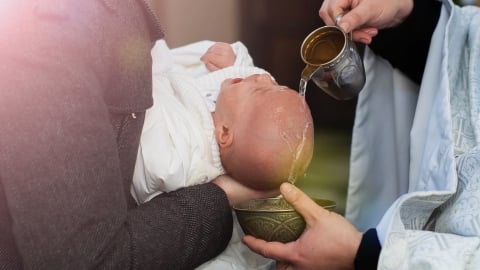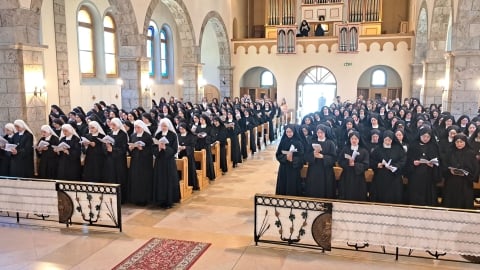The Didache: Baptism, Prayer, and the Eucharist

The Didache, sometimes called “The Lord’s Teaching Through the Twelve Apostles to the Nations” in reference to its opening line, is a first-century document governing the Church and one of the oldest catechetical texts in Christendom. This third installment of a five-part series on the Didache explores its teaching on baptism and the Eucharist.
Read Part 2: "The Didache: The Two Ways"
Read Part 1: "The Didache: Introduction, Origin, and Rediscovery"
Instructions Concerning Baptism
After a brief admonition in Chapter 6 to beware of false teachers and reject food sacrificed to idols, the Didache turns to the rite of baptism in Chapter 7.
And concerning baptism, baptize this way: Having first said all these things, baptize into the name of the Father, and of the Son, and of the Holy Spirit, in living water. But if you have not living water, baptize into other water; and if you cannot in cold, in warm. But if you have not either, pour out water thrice upon the head into the name of Father, and Son, and Holy Spirit. But before the baptism let the baptizer fast, and the baptized, and whatever others can; but you shall order the baptized to fast one or two days before.
The baptismal formula is essentially identical to Christ’s instructions to the Apostles at the end of the Gospel of Matthew (28:19). Due to the early dating of the Didache (perhaps as early as 40 AD), it is possible this chapter predates St. Matthew’s composition, which scholars place between 60-80 AD. It would be incorrect, however, to believe one text relies on the other; both reflect a shared tradition held by the earliest Christian communities based on Jesus’s final earthly words.
With respect to the Didache’s instructions, it is noteworthy that three versions are presented in descending order from an ideal to means fitted for particular circumstances. The text’s reference to “living water” means flowing water, such as a river, while the remark on “other water,” which can be either cold or warm, points to using a cistern or pool for the sacrament. Finally, the text speaks of baptism by pouring, which testifies to the ancientness of the practice still followed in the Roman Catholic Church. All three variants are acceptable and may indicate that the Didache was composed in an arid environment where free-flowing water was scarce.
The Didache’s baptismal instruction closes with a call for not only those who are to be baptized to fast, but for baptizers and the faithful generally to join in this fast. Centuries later, as the Universal Church developed its liturgy and disciplines for Lent, this instruction was intertwined with the penitential practices of the Lenten season.
On Prayer and Fasting
Chapter 8, which is also brief, sets forth guidelines for prayer and fasting.
But let not your fasts be with the hypocrites; for they fast on the second and fifth day of the week; but fast on the fourth day and the Preparation (Friday). Neither pray as the hypocrites; but as the Lord commanded in His Gospel, thus pray: Our Father who art in heaven, hallowed be Your name. Your kingdom come. Your will be done, as in heaven, so on earth. Give us today our daily (needful) bread, and forgive us our debt as we also forgive our debtors. And bring us not into temptation, but deliver us from the evil one; for Yours is the power and the glory forever. Thrice in the day thus pray.
For the Didache’s author, “the hypocrites” here means the Jews, who fast on Mondays and Thursdays. Christians, for their part, should fast not only on Fridays, but on Wednesdays as well—a practice still followed by certain Eastern Christian communions and adhered to by traditional Latin Catholics on Ash Wednesday and during the Ember Days. And for prayer, Christians are instructed to avoid praying with the nearby Jewish communities, but rather pray the Our Father as Christ taught.
Like the Didache’s baptismal formula, the text of the Our Father is close to that contained in the Gospel of Matthew (6:9-13), but with a closing doxology that is missing from some early gospel manuscripts. The practice of praying the Our Father thrice daily quickly expanded in the following centuries as the Divine Office took shape where it, along with the Psalms, became the foundational liturgical prayer of the Church. Even those who do not participate in the daily liturgical hours are still directed to recite the Our Father during morning and evening prayers, along with including it with other time-honor devotions, such as the Rosary.
Celebrating the Eucharist
Chapters 9-10 concern the Eucharist, which has caused consternation for some.
Now concerning the Thanksgiving (Eucharist), thus give thanks. First, concerning the cup: We thank you, our Father, for the holy vine of David Your servant, which You made known to us through Jesus Your Servant; to You be the glory forever. And concerning the broken bread: We thank You, our Father, for the life and knowledge which You made known to us through Jesus Your Servant; to You be the glory forever. Even as this broken bread was scattered over the hills, and was gathered together and became one, so let Your Church be gathered together from the ends of the earth into Your kingdom; for Yours is the glory and the power through Jesus Christ forever. But let no one eat or drink of your Thanksgiving (Eucharist), but they who have been baptized into the name of the Lord; for concerning this also the Lord has said, Give not that which is holy to the dogs.
It remains a point of contention to this day how best to interpret this instruction. For modern liturgical scholars and theologians who are invested in downplaying or obscuring the sacrificial character of the Mass, these lines—which are, at best, an incomplete Eucharistic prayer—are cited as “proof” that the Words of Institution were unnecessary in the early Church or that the Eucharist is not a sacrifice, but merely a meal.
In response to these and similar claims, it is important to note that while early Christian communities did gather to share a communal meal, this act was separate from the Eucharist proper and that the two should not be conflated. Moreover, the Didache is not a complete handbook of either moral or sacramental theology; its instructions often presuppose a larger tapestry of teachings and practices that the Didache’s author did not feel compelled to chronicle in full. Moreover, as will be discussed in the next installment in this series, Chapter 14 speaks of a specific sacramental gathering held on Sundays, which again is distinct from a communal meal. It is also noteworthy that the Didache’s Eucharistic prayer (assuming that is what it is) is idiosyncratic at best and does not serve as the basis for ancient liturgies such as the Mass of Pope St. Gregory the Great in the West or the Liturgy of St. John Chrysostom in the East.
Chapter 10, which is the final chapter under consideration in this installment, directs Christians to give thanks to God. Whether this thanksgiving is to be offered after sacramental Communion or a communal Christian meal is also debatable. Either way, the text bears repeating.
But after you are filled, thus give thanks: We thank You, holy Father, for Your holy name which You caused to tabernacle in our hearts, and for the knowledge and faith and immortality, which You made known to us through Jesus Your Servant; to You be the glory forever. You, Master almighty, created all things for Your name’s sake; You gave food and drink to men for enjoyment, that they might give thanks to You; but to us You freely gave spiritual food and drink and life eternal through Your Servant. Before all things we thank You that You are mighty; to You be the glory forever. Remember, Lord, Your Church, to deliver it from all evil and to make it perfect in Your love, and gather it from the four winds, sanctified for Your kingdom which You have prepared for it; for Yours is the power and the glory forever. Let grace come, and let this world pass away. Hosanna to the God (Son) of David! If anyone is holy, let him come; if anyone is not so, let him repent. Maranatha. Amen. But permit the prophets to make Thanksgiving as much as they desire.
The eschatological expectation present at the end of this prayer cannot be overstated, nor the early Christian exuberance for Christ’s saving revelation found throughout. It is an exuberance that is sorely missing nearly two millennia later. For the original Christian audience of the Didache, God should be praised not simply for his material benefits (“food and drink to men for enjoyment”), but even more so for the “spiritual food and drink and life eternal” given freely by Christ. The gift of revelation, which allows all to see the contingency and fleetingness of this life while looking forward to the eternal life to come, is worthy of perpetual thanksgiving.
sspx.org - 10/05/2023





